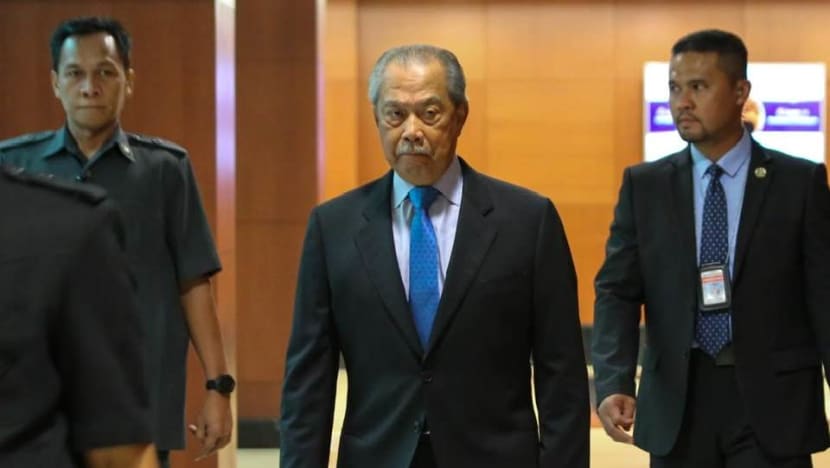Perikatan Nasional chairman Muhyiddin says government’s proposed deal on fund allocation for MPs has ‘hidden agenda’
Several government MPs have since hit back against Muhyiddin Yassin’s statement, with one calling on the former prime minister to propose an alternative memorandum of understanding for the allocations.

A file photo of the chairman of Perikatan Nasional Muhyiddin Yassin. (Photo: Facebook/Muhyiddin Yassin)
SINGAPORE: The chairman of Malaysia’s opposition coalition Muhyiddin Yassin has slammed a proposed deal on constituency fund allocations for its Members of Parliament (MPs) by the federal government, claiming that it was an attempt to silence them from speaking out on several issues.
The proposed allocated funds are meant to be used by MPs for their respective parliamentary constituencies.
Muhyiddin’s comments come after Leader of the Opposition Hamzah Zainuddin – who is also the secretary-general of Perikatan Nasional (PN) – rejected the proposed memorandums of understanding (MOUs), saying that it could affect the rights and privileges of the Malays and Bumiputeras in the country.
The latter is a term used to describe Malays, the Orang Asli of Peninsular Malaysia, as well as the various indigenous people of East Malaysia.
On Tuesday (Sep 17), Muhyiddin said that the proposed deal has a “hidden agenda to curb the freedom of the MPs from being the voice of the voters who have chosen them to be their representation in Parliament”.
“For example, the MOU has a chapter especially on 3R issues (race, religion and royalty) that bars MPs from speaking out on them. Raising these issues is deemed as spewing hatred.
“This is not right. This country was built upon an understanding between the races or the social contract, which was then incorporated into the Federal Constitution,” he was reported as saying by The Star.
Muhyiddin added that the proposed MOUs would stop the opposition MPs from making statements that are “discriminatory to any other parties based on religion, race, or any other identity factors”.
“This identity includes LGBT (lesbian, gay, bisexual or transgender) groups. Does this mean that if Perikatan MPs agree to the MOU, we cannot speak up on any policies or laws that may be enacted by the Pakatan-Barisan government in the future?” he reportedly asked, adding that this was against the values of Malaysians.
Related:
Several government MPs have since hit back against Muhyiddin’s statement, with one calling on the former prime minister to propose an alternative MOU for the allocations.
“His comments are very shallow. He should have proposed an alternative MOU and been open to discussions,” said Mr Taufiq Johari - an MP from Prime Minister Anwar Ibrahim’s Parti Keadilan Rakyat (PKR) – as quoted by Free Malaysia Today (FMT).
Meanwhile, Ledang MP Syed Ibrahim Syed Noh posited that it was incorrect for Muhyiddin to state that the proposed MOUs would restrict the opposition from highlighting issues related to religion or race.
“It’s not to say that these issues cannot be raised at all … It is more important to raise such issues, find mature ways to discuss them, and propose good solutions,” said the PKR MP.
Meanwhile, political secretary at the PKR President’s Office Onn Abu Bakar questioned whether PN’s rejection of the proposed MOUs was due to their refusal to declare their assets.
The declaration of the MPs' assets was among the conditions imposed by the federal government to allow the opposition parliamentarians to receive the allocation as demanded.
“This surely has raised questions about their commitment to transparency because transparency is the basis of the people’s trust in leaders,” Mr Onn was quoted as saying by Bernama.
Following the rejection of the proposed deal by Mr Hamzah over the weekend, Deputy Prime Minister Fadillah Yusof on Sep 16 revealed the contents of the MOUs.
The first MOU draft – which would have been signed between the federal government and the individual MPs – outlines their role in providing checks and balances, among others.
Meanwhile, the second draft MOU would have been signed between the federal government and PN, binding all its MPs to the agreement, FMT reported.
Mr Fadillah had previously told local media that the MOUs were necessary to ensure mutual understanding between the federal government and the opposition in order to focus their efforts on developing and reviving the Malaysian economy for the well-being of the people.














